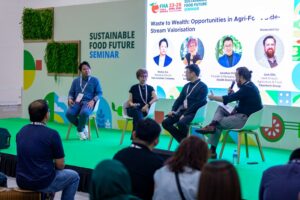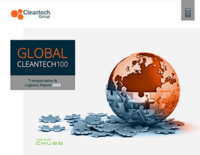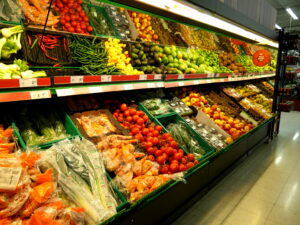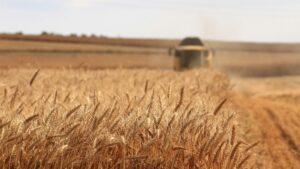Trash Talking: Three Approaches to Food Waste Valorization in Asia
I recently had the pleasure of moderating a discussion on food waste valorization at the FHA Food & Beverage 2024 event in Singapore.
It’s the region’s largest gathering of food manufacturers, foodservice companies, and foodtech entrepreneurs, welcoming well over 70,000 delegates from 91 countries in Singapore’s sprawling Expo convention center.
While dialog and dealmaking between different food sector stakeholders is the event’s bread-and-butter, there’s also time for typical conference content in the form of panel discussions exploring some of the key issues facing the industry today – not least around questions of sustainability and technological innovation.
Food waste is one such issue, and the agrifood industry is increasingly looking for ways to avoid landfills and incinerators to repurpose its waste byproducts, generating new revenue streams and addressing environmental and social challenges in the process.
Hosting a panel titled ‘Waste to Wealth: Opportunities in Agri-Food Side-Stream Valorization,’ I was joined by three stellar speakers from Singapore’s agrifoodtech scene to explore this topic:
- Florence Leong, Founder and Director, KosmodeHealth
- Weitze Ooi, Managing Director, Dole Specialty Ingredients, Dole Sunshine Company
- Jonathan Poh, Founder and Managing Director, Otolith Enrichment

The following are some of the highlights from the panel discussion.
From Upcycling to Value Maximization
Leong’s start-up has developed proprietary technology to extract proteins, fibers, and other useful compounds from various types of agrifood processing waste. Some of these compounds have significant nutritional value and can be used in supplements and functional foods, including its diabetic-friendly, zero-starch, zero-cholesterol noodles made from brewery and malting sidestreams. Other extracts have use as bio-scaffolds in cutting-edge industries including cultivated meat production.
“When most people talk about repurposing food waste today, they talk about ‘upcycling’,” with many agrifood manufacturers quite happy to have sustainability-themed start-ups take their waste away for free,” she said. This allows them to demonstrate their waste has been dealt with in a more environmentally friendly way than landfill; for example, with it ending up as feedstock for biogas production in an anerobic digester.
But Leong argued that a change in corporate thinking is required, and that the by-now mainstream language of ‘upcycling’ no longer fits the bill.
“One of the challenges is to change mindsets,” she said. “We need to open minds to think beyond upcycling, to begin thinking about how [they] can extract maximum value from their waste. I don’t think we should think only in terms of ‘reduce, re-use, recycle’. Besides that, we should be thinking about maximizing the value of our waste.”
In other words, we need to see agrifood waste as a business opportunity, rather than simply as a problem that needs solving.
At the same time, many communities around the world – and not just in lower-income regions – need access to foods that can provide improved nutrition at lower cost and lower environmental impact, she added. “Surely, it makes sense for us to make use of this waste if it can provide that nutrition.”
Getting C-suite Buy-in
Dole is one multinational that appears to have already adopted this perspective. Best known as a purveyor of bananas and pineapples, in recent years it has developed new food and industrial products from the significant amount of agricultural waste that results from cultivating and processing these fruits.
Dole Specialty Ingredients now accounts for a substantial share of the group’s overall revenues, and Ooi shared some advice to other agrifood corporates who might be interested in taking the waste valorization plunge.
“I’ll say something first: It’s a very difficult business,” he admitted. “But that doesn’t mean I don’t recommend it.”
If waste is to become a successful revenue source, then one must go back to business basics.
“There are only two things you need to think about: the first is what is the nutritious part or the valuable part you can get from this waste stream? The second is volume: Are you producing enough of this waste sidestream for you to actually start a business?”
He continued, “If you go out to your [prospective] customers they will ask, ‘What is the cost?’ and ‘Is this safe?’ The sustainability comes later.”
Don’t Forget the Social Aspect
Poh pointed out that it isn’t just company executives that need convincing; often, it’s ‘Joe Public’, too.
Otolith Enrichment, the social enterprise he founded in 2017, aims to do this through direct engagement and getting the public’s hands dirty – quite literally.
“It’s Singapore’s first and only circular ecosystem located within a residential area, and we accept food waste that is contributed by businesses as well as households,” he explained.
It operates its black soldier fly farm in a Singapore public housing estate, obtaining kitchen food waste from local residents and schools to feed its larvae.
The frass (excrement and debris) from the larvae is used as a biofertilizer in local fruit and vegetable patches. The larvae themselves are fed to edible fish that inhabit an aquaponics system; the fishes’ excrement enriches the water in the system, which in turns feeds leafy greens and other indoor-grown crops.
Local residents and schoolkids are encouraged to roll up their sleeves and help out at the project.
Given the investor interest around waste-valorizing insect farms – companies like Ynsect and Innovafeed have raised hundreds of millions of dollars in venture funding between them – I asked Poh why he had decided to go down the social enterprise route, with profit a secondary consideration. “It just came naturally,” he said, noting that circularity and environmental sustainability had been passions of his for a long time.
Echoing this and Ooi’s earlier caveat that food waste valorization is “a very difficult business,” Leong said “I wouldn’t say I got into this business; I would say I got into this passion. Because it is very hard as a business, and so it definitely has to be a passion, too.”
_____________________________________________________________________________________________________________________________
For a deeper dive into the opportunities around mitigation and valorization of agrifood waste streams, please keep an eye out for Cleantech Group’s upcoming Agrifood Waste Mitigation Sector Insight, publishing soon.



